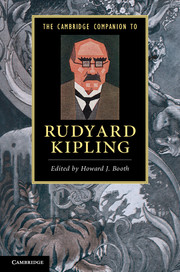Book contents
- Frontmatter
- Introduction
- 1 Kipling and the fin-de-siécle
- 2 India and empire
- 3 Kipling’s very special relationship: Kipling in America, America in Kipling
- 4 Science and technology
- 5 Kipling and gender
- 6 Kipling and war
- 7 Kipling as a children's writer and the Jungle Books
- 8 'Nine and sixty ways’: Kipling, ventriloquist poet
- 9 Kim
- 10 The later short fiction
- 11 Kipling and postcolonial literature
- 12 Kipling and the visual: illustrations and adaptations
- 13 Reading Kipling in India
- Further reading
- Index
9 - Kim
Published online by Cambridge University Press: 28 September 2011
- Frontmatter
- Introduction
- 1 Kipling and the fin-de-siécle
- 2 India and empire
- 3 Kipling’s very special relationship: Kipling in America, America in Kipling
- 4 Science and technology
- 5 Kipling and gender
- 6 Kipling and war
- 7 Kipling as a children's writer and the Jungle Books
- 8 'Nine and sixty ways’: Kipling, ventriloquist poet
- 9 Kim
- 10 The later short fiction
- 11 Kipling and postcolonial literature
- 12 Kipling and the visual: illustrations and adaptations
- 13 Reading Kipling in India
- Further reading
- Index
Summary
'Kim dived into the happy Asiatic disorder which, if you only allow time, will bring you everything that a simple man needs.' Rudyard Kipling was far from being a 'simple man'. But in his most successful novel, he wrote about a boy whose enjoyment of 'happy Asiatic disorder' matched his own. The Irish orphan travels among all sorts of Indians with enviable freedom and street smarts while watched over by a diversity of caring father figures: the Teshoo Lama, Mahbub Ali, Lurgan Sahib, Hurree Chunder Mookerjee, Col. Creighton. These surrogate fathers are sure that Kim is the very person they need, either to play the Great Game or, in the case of the Lama, to help find the sacred River of the Arrow. And Kim does not disappoint. Kipling's ideal boy is 'Friend of all the World'. He is delighted by almost all aspects of India as well as by his own escapades: 'It was all pure delight ...' (K 207).
‘ Kim is many things’, writes Fred Lerner: ‘a spy story, a quest novel, a Bildungsroman, but above all, it is a love letter to India, a celebration of the sounds and smells and colours of the subcontinent.’ Kim is also an imperialist adventure tale with a boy-hero, akin to the novels of G. A. Henty. One of Kipling’s major innovations is making Kim, though Irish and therefore a ‘sahib’, more like the Indians he lives among than like an Irish or British boy.
- Type
- Chapter
- Information
- The Cambridge Companion to Rudyard Kipling , pp. 126 - 140Publisher: Cambridge University PressPrint publication year: 2011
- 2
- Cited by



